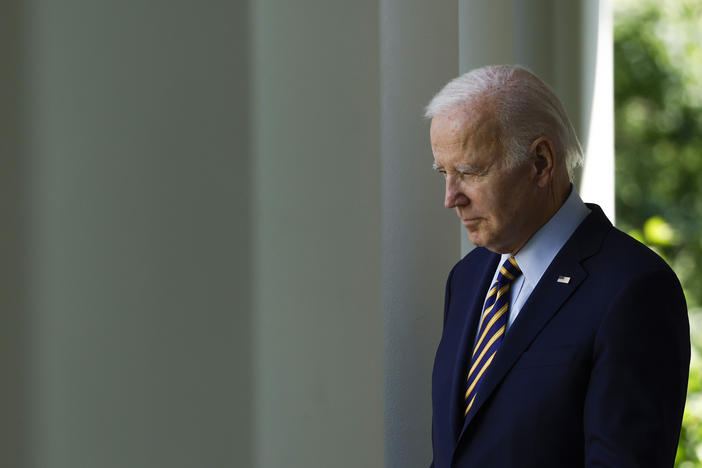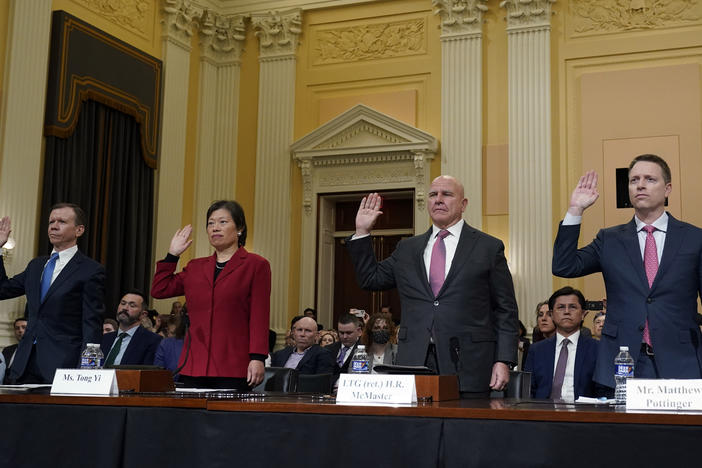Section Branding
Header Content
NSC spokesperson John Kirby says Biden-Xi meeting 'very productive'
Primary Content
NPR's Michel Martin speaks with John Kirby, President Biden's spokesman on the National Security Council, about Biden's meeting Wednesday with Chinese leader Xi Jinping.
Transcript
MICHEL MARTIN, HOST:
President Joe Biden says he has reached some agreements with Chinese President Xi Jinping yesterday during their first face-to-face meeting in a year.
(SOUNDBITE OF ARCHIVED RECORDING)
PRESIDENT JOE BIDEN: Today, building on the groundwork we laid over the past several months of high-level diplomacy between our teams, we've made some important progress, I believe.
MARTIN: Biden announced that China and the U.S. will resume military communications and work together to slow the transport of fentanyl from China. For more, I'm joined by John Kirby. He is the National Security Council coordinator for strategic Communications. Mr. Kirby, welcome. Thanks for joining us.
JOHN KIRBY: Thanks for having me. Good to be with you this morning.
MARTIN: So likewise. So it's my understanding from our White House correspondents that given how tense relations between the U.S. and China have been, the White House set expectations for this meeting fairly low. So now that it's taken place, how would you characterize the conversation?
KIRBY: I think this was a very productive conversation between the two leaders. And I think the big difference between this meeting yesterday and the one in Bali a year ago is that we came out of it with some very tangible deliverables that will benefit our national security and the American people. We talked about the Chinese agreeing to use law enforcement action to go after the export of the chemical ingredients which form fentanyl, and then, of course, the big development, getting our military-to-military communications back on track.
So now at various levels, all the way from the top down to the theater commander and even below, we're going to be able to have our two militaries talk to one another to try to avoid incidents where miscalculation could spiral into some kind of conflict. And there was also agreements to work together on artificial intelligence. There were discussions about trade, certainly discussions about the tensions in Europe and the Middle East, but really a solid set of four hours' worth of really meaningful discussions, again, with tangible deliverables and results that will benefit a lot of people.
MARTIN: So we don't have time to talk about all of this, so let's just take a couple of those. Let's talk - let's start with the military-to-military communication, as people may remember that China cut off that military-to-military communication with the U.S. after former House Speaker Nancy Pelosi traveled to Taiwan. What does it mean that communication is back on? How soon does that start and what does that mean?
KIRBY: It literally means that now the Secretary of Defense can pick up the phone and call his counterpart in Beijing. It means that our Indo-Pacific commander, Admiral Aquilino, four-star admiral based in Hawaii, now can have routine discussions with his counterpart in the People's Liberation Army. And it means that at various other working levels, even at lower ranks, we'll be able to have direct communications with our Chinese counterparts. And this is really important not only because you can deconflict, say, exercises and operations and explain yourselves to one another, but when the tensions get high, you know, with intercepts in the air or ships coming too close at sea, we can immediately try to explain ourselves to one another, deconflict the tensions, and keep things from boiling into some sort of conflict.
MARTIN: So let's talk more about the agreement that the two presidents made on fentanyl. You know, China committed to stemming the flow of fentanyl under President Trump, too. Clearly this is still a problem. What are the specific assurances that China is going to be more successful in this effort in stopping the flow of these precursor chemicals this time around?
KIRBY: Now what they've agreed to do is to crack down on the labs that are making these chemicals, to limit their production, but also using law enforcement to crack down on the export of that material to the United States. And as a result of these agreements, there's also going to be more law enforcement cooperation between our two countries on this exact issue. And that hasn't happened in a number of years. So the level of transparency, and quite frankly, through law enforcement, the level of accountability will all go up.
MARTIN: We know that the two leaders talked about the war between Israel and Hamas. China is allied with Iran. Iran supports Hamas. Did Biden ask Xi to use China's influence to - I don't know - dial back their rhetoric against Israel? And should China be playing a larger role in facilitating peace negotiations, you know, whether between Israel and Hamas or Russia and Ukraine?
KIRBY: Now, we have made it clear to China, because of their communications with Iran, that we would like them to use their influence with Iran to make sure that Iran takes seriously our concerns about escalation and deepening of this conflict.
We have not seen China provide lethal capabilities to Russia's army. They haven't condemned the invasion. Clearly, they're not exactly - or not holding Mr. Putin accountable through sanctions and making it harder for him to conduct this war against Ukraine. But they haven't provided lethal capabilities. We're glad to see that. We don't think that that's going to be in China's interest. But look, there's a defense relationship between these two countries that's growing together. We want to better understand that. We certainly don't want to see that do anything to cause more instability, more insecurity on the European continent.
MARTIN: That's John Kirby. He's the National Security Council coordinator for strategic communications. Mr. Kirby, thanks so much for talking to us once again.
KIRBY: My pleasure. Good to be with you. Transcript provided by NPR, Copyright NPR.
Bottom Content



